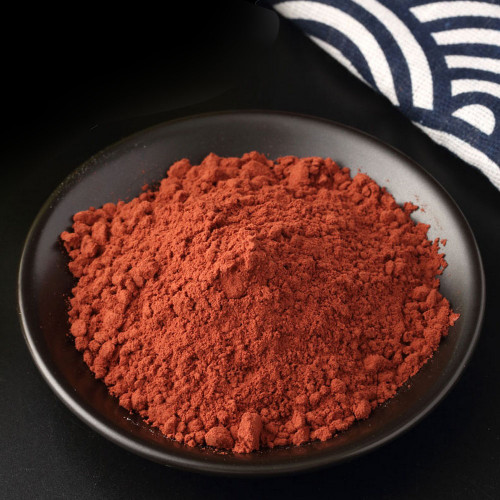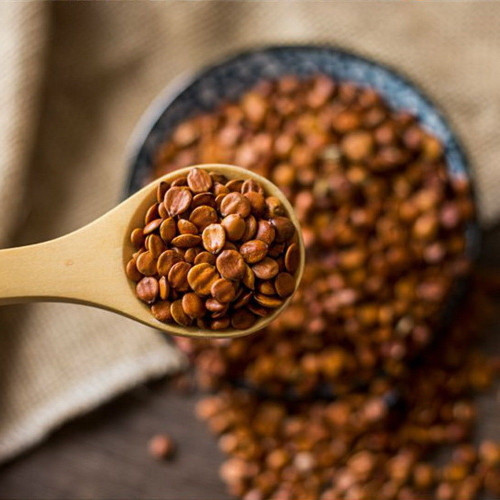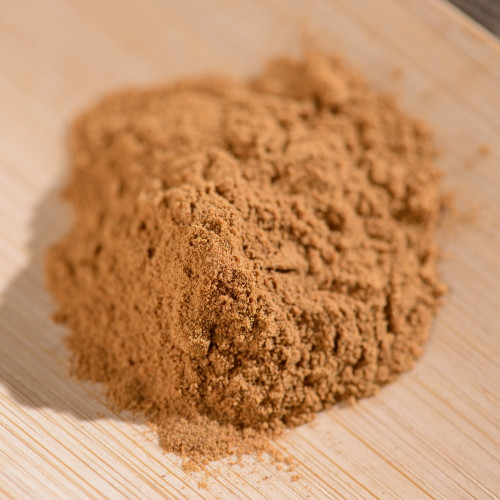Product Overview
Description: After a ripe peach is picked, the fruit stone is taken out and broken to get the kernel, which is then dried in the sunlight. Peach seeds not only look like almonds, but also taste like almonds. And just like almond, it is also edible and has long been loved and eaten since ancient times, thanks to its special taste and flavor. In view of its great contribution on health benefits and high nutritional value, it is also listed as one of top 10 precious healthy foods by holistic diet regimen experts. As one of frequently-used Chinese herbs, it is suitable for general population, especially patients who suffer from high blood sugar, diabetes or liver problem.
When used as a Chinese medicine, it mainly refers to the ripe seeds of Prunus persica (L.) Batsch or Prunus davidiana (Carr.) Franch. Both of them are plants belonging to the family Rosaceae. Other common names of this herb include seeds of peach, Semen Persicae, Peach Kernel, Semen Pruni Persicae, peach tree seeds, peach pits, peach fruit seeds, and the like. Prunus persica seeds are produced all over China and most of them are cultivated; Prunus davidiana seeds mainly grow wild in provinces of Liaoning, Hebei, Henan, Shandong, Sichuan, and Yunnan. They are usually picked from June to July when the fruits are ripe. The following steps are to remove the flesh and pit shell, take the seeds, peel them, and dry in the sun. Medicinally it is normally used raw or fried.
Traditional Chinese medicine thinks it is of neutral nature. That’s to say, as a food the ingestion of it won’t let you risk suffering from internal heat. Instead, consuming peach seeds is good for you no matter you are of cold or heat habitus since it plays a certain restrain dilution role.
The most valued healing properties of peach seed in TCM are its effect of promoting blood circulation. Given the fact of backward medical technology in ancient times, dietary therapy or herbs was one of the few available ways that could count on once people suffered from stagnant movement of Qi and blood. And peach seed nut is that one commonly used medically to invigorate the circulation of blood. It is said that it was once so expensive and rare that few people then could afford it. Likewise, it can be applied to treat scarce menstrual flow or even absence of menstruation in women.
Besides, it is also a good aperient since it contains certain of fatty oil, which can help obstructed bowel or indigestion. Eating peach seeds on daily basis can lubricate the intestine, keep the intestine smooth, and improve bowel function. It is worth noting that obstructed bowel is very likely to cause the proliferation of bacteria, and thus lead to intestinal inflammation. That’s to say, appropriate consumption of it is beneficial to intestinal discharge of waste, prevention of intestinal inflammation, and even the treatment of intestinal inflammation.
Modern pharmacological actions of peach kernel
1) Its extracting solution can significantly increase cerebral blood flow, enhance the blood flow in canine femoral arteries, reduce vascular resistance, and improve the hemodynamics;
2) Peach seed extract can improve liver surface microcirculation and promote bile secretion;
3) It can obviously prolong the bleeding and clotting time;
4) Its decoction can promote fibrosis and in vitro inhibit thrombosis;
5) It contains 5% fat oil, which can lubricate the intestine and then help defecation;
6) It can promote the uterine contractions and bleeding in woman who has been delivered of a child for the first time;
7) Its decoction and extract have analgesic, anti-inflammatory, anti-bacterial, and anti-allergic effects;
8) Amygdalin contained has antitussive, anti-asthma, and anti-liver fibrosis effects.
Brewing Guide: Pour 1 cup of boiling water over ¼ to ½ teaspoonful of powder. Drink 1-2 cups of it daily.
Sample peach seed recipes on herbal remedies
The Chinese Pharmacopoeia believes that it is bitter and sweet in flavor and neutral in nature. It goes to meridians of heart, liver, and large intestine. Basic functions include activating blood to remove blood stasis and relaxing bowel. Essential peach seed uses and indications are amenorrhea, dysmenorrhea, mass in the abdomen, injuries, and constipation caused by intestinal dryness.
1) Tao Hong Si Wu Tang from Yi Zong Jin Jian (Golden Mirror of Orthodox Medicine). It is formulated with Hong Hua (Safflower), Dang Gui (Dong Quai), Chuan Xiong (lovage), Chi Shao (Red Peonies), etc. to treat amenorrhea and dysmenorrhea caused by blood stasis.
2) Sheng Hua Tang from Fu Qing Zhu Nu Ke (Fu Qing-zhu’s Gynecology). It is combined with Pao Jiang (Prepared Dried Ginger), lovage, etc. to cure postpartum abdominal pain due to stagnation.
3) Gui Zhi Fu Ling Wan from Jin Gui Yao Lue (Essential Prescriptions of the Golden Coffer). It works with Gui Zhi (Ramulus Cinnamomi), Mu Dan Pi (Tree Peony), Red Peonies, etc. to heal abdominal mass in women due to the accumulated stasis.
4) Tao He Cheng Qi Tang from Shang Han Lun (On Cold Damage). It is equipped with Da Huang (rhubarb), Mang Xiao (Glauber’s Salt), cassia twig, etc. to treat severe abdominal mass due to stagnation.
5) Fu Yuan Huo Xue Tang from Yi Xue Fa Ming (Illuminating the Science of Medicine). It is matched with Dong Quai, Safflower, rhubarb, etc. to cure wound, bruises, and pains.
6) Wei Jing Tang from Qian Jin Fang (Thousand golden essential prescriptions). It is used together with Wei Jing (Phragmites Communis Stem), Dong Gua Ren (Winter Melon Seeds), etc. to treat pulmonary abscess.
7) Da Huang Mu Dan Pi Tang from Essential Prescriptions of the Golden Coffer. It is joined with rhubarb, Tree Peony Bark, etc. to cure acute appendicitis.
8) Run Chang Wan from Pi Wei Lun (Treatise on the Spleen and Stomach). It is compatible with Dong Quai, Huo Ma Ren (Hemp Seeds), Gua Lou Ren (Semen Trichosanthis), etc. to heal constipation caused by dry intestine.
9) Shuang Ren Wan from Sheng Ji Zong Lu (Complete Record of Holy Benevolence). It is coupled with Xing Ren (Apricot Seed) to treat cough and asthma.













